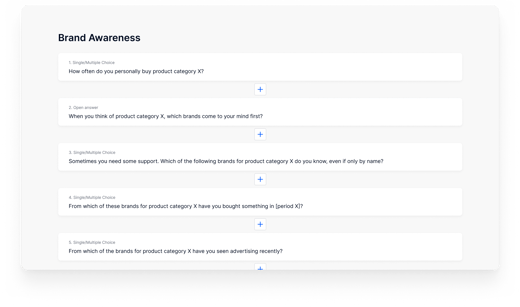Brand Awareness Survey
Appinio Research · 20.10.2022 · 14min read

Content
When it comes to product categories, consumers often associate certain brands with them. For instance, Nike and Adidas are two popular sportswear brands, while Volkswagen, Mercedes, and Audi are some of the leading car brands.
Whether it's their favorite brand or a brand that they recently came across through a captivating advertisement, it's important for companies to ensure that their brand is constantly on the minds of their target consumers.
This is where brand awareness comes in, which refers to the percentage of consumers within a particular group who recognize a brand.
But how do companies determine if their brand is top-of-mind among their target audience?
The answer lies in conducting a brand awareness survey.
In this article, we'll discuss the importance of brand awareness surveys and how to conduct them effectively.
Can't wait to run your brand awareness study? Talk to our experts!
Did you know that Appinio is leveraging also a new and innovative method to track your brand? Discover Mental Availability (MA), a revolutionary approach to brand tracking developed by marketing experts Jenni Romaniuk and Byron Sharp.
Mental Availability measures how likely a brand is to come to mind in various buying situations, providing predictive, actionable, and reliable insights.
Key metrics include Mental Market Share, Mental Penetration, Network Size, and Share of Mind. These offer a dynamic and accurate picture of brand health by focusing on Category Entry Points (CEPs), the critical moments when a brand must come to mind, read more about Mental Availability and how it can help you.
If you are interested in this new approach, have a deep dive and listen to our research director Louise Leitsch explaining Mental Availability in detail!
![]()
What is Brand Awareness?
Brand awareness refers to the percentage of consumers within a specific target group who are familiar with a brand.
This includes the number of people who can recall the brand without any prompting, as well as those who have heard of the brand before.
Essentially, brand awareness is a measure of how well-known a brand is among its intended audience.
Having strong brand awareness is crucial for businesses, not only as it influences how consumers perceive the brand (i.e. brand image), but also because it influences consumer purchasing decisions.
Note that brand awareness doesn't necessarily mean that consumers remember the brand name specifically, but rather that they recognize enough characteristic features of the brand.
Why is Brand Awareness important?
Consumers tend to gravitate towards brands that they are already familiar with, especially when it comes to low-involvement products such as milk, pasta, or cleaning agents.
These are items that consumers purchase without much thought or research, and thus brand awareness becomes crucial.
When consumers are faced with these types of products, they are more likely to reach for brands they recognize or have heard of before.
Brand awareness is also important for interchangeable products where the features, quality, and price points are relatively similar between brands.
In such cases, consumers are more likely to choose products from well-known brands.
This is also true for completely new products, as consumers often trust established brands and are more likely to purchase from them.
In short, having a high level of brand awareness can give businesses a significant advantage in terms of consumer purchasing decisions, especially when competing against unknown or lesser-known brands.
Research experts answer: Why is Mental Availability important?
Mental Availability is crucial for brands as it ensures they are top-of-mind when consumers are ready to make a purchase. By understanding and leveraging different category entry points—specific occasions, needs, or contexts where consumers think of a product—brands can effectively position themselves to capture more buying opportunities and drive growth.
Types of Brand Awareness
 There are three main types of brand awareness: top-of-mind awareness, unaided recall, and aided recall.
There are three main types of brand awareness: top-of-mind awareness, unaided recall, and aided recall.
Top-of-mind awareness refers to the brand that immediately comes to a consumer's mind when asked about a particular product category, while unaided recall is the ability of consumers to remember a brand without any prompting. Aided recall, on the other hand, refers to the ability of consumers to remember a brand when given a list of options or other prompts.
Each type of brand awareness provides valuable insights into a brand's overall visibility and perception among its target audience and we'll delve into each type.
Top-of-Mind Awareness
Top-of-mind awareness refers to the brand that immediately comes to consumers' minds when asked about a specific product category.
It represents the first brand that consumers think of, often on the "tip of their tongue".
For example, if a consumer is asked about smartphone brands and answers "Apple", then Apple has high top-of-mind awareness for that individual.
However, having a high top-of-mind awareness does not necessarily mean that the brand is also the consumer's favorite or most frequently purchased. Rather, it simply indicates that the brand is the most recalled.
In order to measure top-of-mind awareness in a brand awareness survey, open-ended questions are often used, such as "When you think of sneaker brands, which brand comes to mind first?"
Unaided Recall
Unaided recall, also known as active brand awareness or brand recall, refers to the percentage of consumers who can recall a particular brand without any prompting or reminder.
This type of brand awareness reflects the extent to which a brand is deeply rooted in consumers' minds and associated with a particular product category or industry.
In the absence of any visual or advertising cues, the ability of consumers to spontaneously recall a brand name indicates their familiarity with and preference for it.
Unaided recall is often measured using open-ended questions that require participants to name brands associated with a particular product category or industry, without any additional information or prompts.
Memory-based decisions, which rely on consumers' ability to recall information about a product, make unaided recall particularly important for brands.
Aided Recall
Aided recall, also known as "passive brand awareness" or "brand recognition," is used to determine whether consumers are aware of a brand or have heard of it before.
This type of brand awareness survey question allows for reminders to be given.
Closed questions are used to ask consumers if they know the brands they are presented with.
Logos or pictures of brands may also be displayed to ask respondents if they are familiar with the brands or have seen their logos before.
Aided recall is particularly important for purchasing decisions at the point of sale, whether in-person or online. When faced with a wide range of brands, consumers are likely to choose the product whose brand they have at least heard of.
All three types of brand awareness survey questions can be combined into one questionnaire.
Eponyms
Eponyms are brand names that have become so popular that they are used interchangeably with the generic term for a certain product category.
For instance, people often use the term "Kleenex" instead of "tissue" or "Google" instead of "search engine."
These brands have become part of everyday language and represent the pinnacle of brand awareness. They are a testament to the brand's success in becoming the go-to product for that category, and are often the result of extensive marketing efforts and effective branding strategies.
Measuring Advertising Effectiveness
Advertising plays a crucial role in creating brand awareness among consumers.
The ultimate goal of an advertising campaign is to increase the number of consumers who recall a brand after seeing the ad.
To measure the effectiveness of advertising campaigns, regular brand awareness surveys and brand tracking are essential.
Before launching a campaign, the target audience is surveyed to determine their familiarity with the brand (pre-campaign evaluation or pre-testing).
During and after the campaign, consumers from the same target group are surveyed using one of the three types of brand awareness survey questions.
To avoid biased results, it is important not to survey the same consumers each time. If more consumers recall the brand in subsequent surveys (unaided recall) or recognize it more frequently (aided recall), this indicates a successful advertising campaign.
Measuring Brand Awareness with online surveys
Measuring brand awareness through online surveys has become increasingly popular in recent years, thanks to the convenience and accessibility of digital market research.
The first step in conducting a brand awareness survey is to create a questionnaire that includes all relevant questions and meets certain quality criteria to ensure reliable results.
Online surveys allow for easy distribution to a large and diverse audience, which can provide valuable insights into the awareness of your brand.
Furthermore, brand tracking studies can be used to measure your brand's awareness over time, as well as the effectiveness of your marketing campaigns. These studies involve asking consumers the same questions repeatedly, which allows for accurate comparisons of results.
In addition to measuring brand awareness, brand tracking surveys can also help you assess brand attributes and loyalty. Overall, online surveys and brand tracking studies provide an efficient and effective way to measure and track brand awareness.
Want to run your brand awareness study?
Recognizing the evolving marketing landscape, it's evident that alongside traditional brand tracking, the concept of "mental availability" is increasingly crucial.
Mental availability delves beyond mere brand awareness; potential buyers are not always actively in the market when they encounter marketing materials. This concept focuses on ensuring that your brand occupies a prime spot in a consumer's mind when buyers will be making those purchase decisions.
Mental availability is distinct from brand awareness. While awareness is a prerequisite for mental availability, research indicates that not all known brands are considered when making a purchase.
Brand tracking offers invaluable insights into performance metrics over time, but incorporating strategies to enhance mental availability can take your brand to the next level.
Get started in minutes by using our free templates for brand awareness in the Appinio platform.
Conclusion for Brand Awareness Surveys
In conclusion, brand awareness is a crucial aspect of any successful marketing strategy. It is important to understand the three types of brand awareness and use them to create effective advertising campaigns that anchor your brand in the minds of consumers. Measuring brand awareness with regular brand tracking surveys is essential to monitor the effectiveness of your marketing efforts and make informed decisions for future campaigns. Digital market research has made it easier than ever to conduct brand awareness surveys and gather valuable insights into consumer behavior. By following the best practices outlined in this article, you can build and maintain strong brand awareness that leads to increased sales and brand loyalty.
Get facts and figures 🧠
Want to see more data insights? Our free reports are just the right thing for you!



